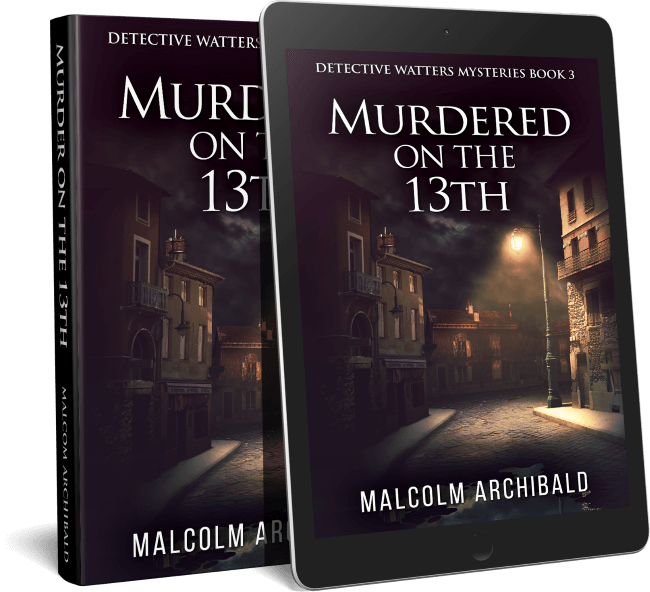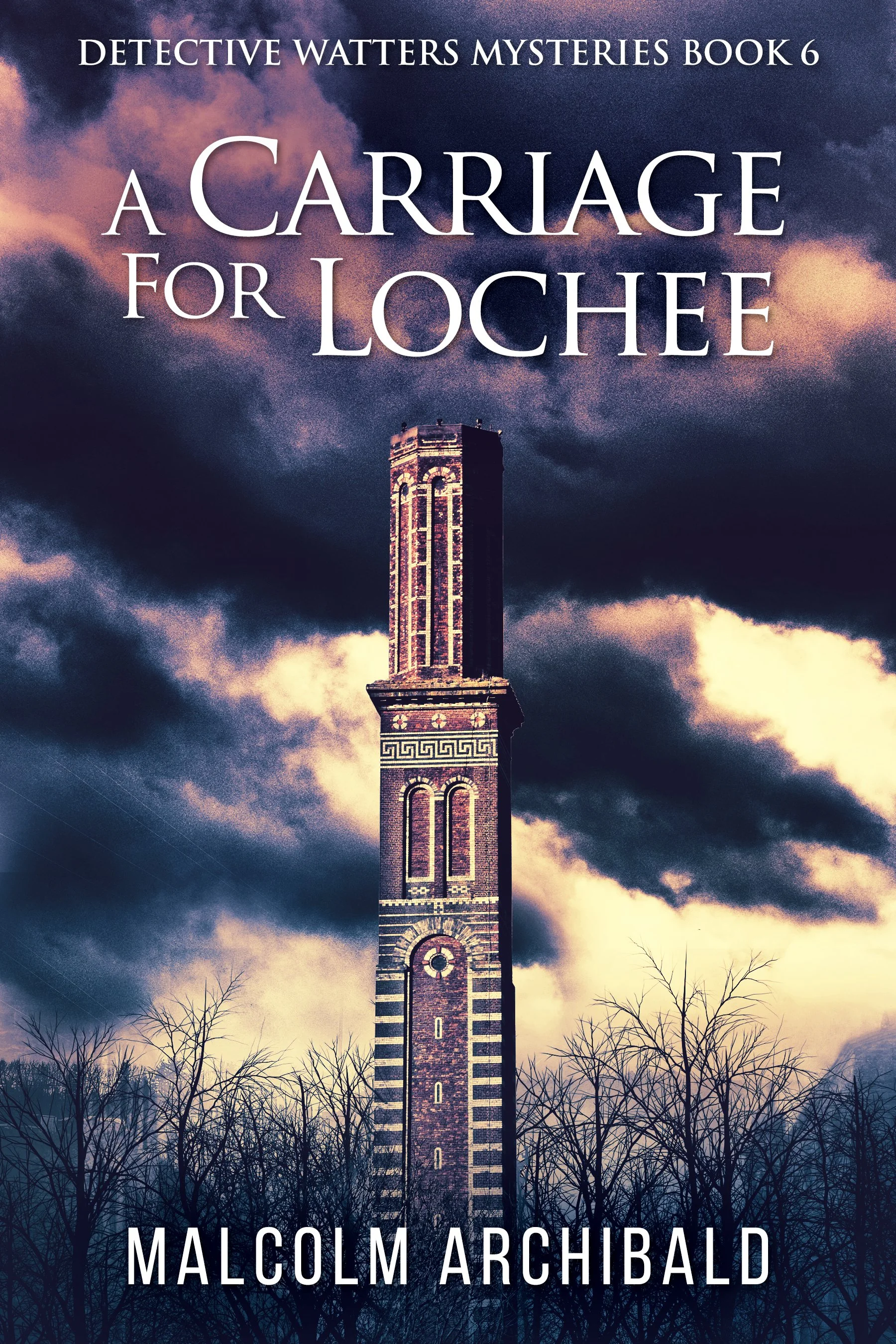The Broughty Ferry Murder (Detective Watters Mysteries Book 7)
Book summary
Inspector George Watters faces a challenging case in 1870 Dundee, tasked with solving a railway robbery and a gruesome murder in Broughty Ferry. As he navigates the complexities of both crimes, Watters must balance leading his men and uncovering the truth behind the mysterious suspects. Will he prove himself in his new rank?
THE BROUGHTY FERRY MURDER is a gripping historical mystery.
Excerpt from The Broughty Ferry Murder (Detective Watters Mysteries Book 7)
Inspector George Watters of the Dundee Police scanned his detectives’ latest reports, sighed, and tucked the foolscap sheet away in its file. Petty theft from washing lines, a simple assault and one case of shoplifting. Where have all the real criminals gone? I thought promotion to inspector would lift me to a higher echelon of crime rather than tie me to administration from a desk.
He looked up hopefully as a gasping constable nearly fell through his open door.
“Yes, Logan? You look agitated.”
“Yes, sir,” Logan said. “Mr Mackay sends his compliments, sir, and could you attend a robbery at the railway station, please.”
Donald Mackay was the long-serving Superintendent of the Dundee Police and a man Watters respected.
“Which railway station?” Watters asked.
Logan hesitated, then smiled as he remembered. “East, sir. Dundee East.”
“Sergeant Scuddamore covers that area, Logan,” Watters reminded patiently. “He’s taken over Dock Street and the eastern side of the town.”
Logan looked surprised. “Yes, sir, but Mr Mackay was quite insistent that you should attend, sir. He says Lord Balmuir is involved.”
Watters nodded. “I see.” He put down his paperwork, lifted his cup and took a drink of his strong black tea. “When His Lordship says jump, we must all ask how high.”
Logan frowned. “If you say so, sir.”
“You’re with me, Logan. I might need you.”
Logan’s face fell. “I’ve only ten minutes of my shift left, sir.”
“Have you worked at a high-class robbery before, Logan?”
“No, sir.” Logan shook his head.
“I thought not. Consider this an essential part of your training. Come on!”
Grabbing his hat and cane, Watters strode from the Bell Street Police Office and headed for the Eastern Railway Station. He walked quickly, swinging his cane at imaginary golf balls as he wondered what awaited him.
“Do you have any details about the robbery, Logan?”
“No, sir. I just carried the message.” Logan had to hurry to keep pace with Watters. He stumbled over an uneven cobblestone, waited for a two-horse omnibus to pass at the Seagate, realised Watters had already crossed the road, and ran, holding his tall hat in place.
Watters nodded as if the traffic had not interrupted their conversation. “All right.” He strode down Trades Lane and across East Dock Street to the railway station, glanced briefly at the posters advertising Claymore Whisky and the Hebridean Property Company and tapped Logan on the arm with his cane.
“Wait here for a moment,” Watters said. “When you first come to a crime scene, take a moment to look around, get a feel for the overall geography of the place.”
“Yes, sir,” Logan said.
“Look for anything or anybody that doesn’t fit in,” Watters said. “For instance, that man there,” he nodded to a slender, undersized man who lounged against a pillar. “No, don’t stare. Watch him through the corner of your eyes. You’ll be aware of movement quicker that way, and he’ll be less nervous of you.”
“I understand, sir,” Logan said.
“That’s Jim Bogle. He used to be a peeper, watching the ladybirds at work, then blackmailing the customers that he’d tell their wives. Now he’s a married man and augments his earnings with a little pocket picking on the side.” Watters strode forward and swung his cane to catch the lounger on the leg. “Off with you, Jim! We’ll have none of your antics here.”
“I’m doing no harm, Sergeant Watters!” Jim jumped away, rubbing at his leg.
“That’s Inspector Watters to you!” Watters lifted his cane threateningly as Jim fled. He shook his head. “Whatever you’re doing, Logan, watch for the minor criminals like Jim Bogle. They are the ones who make life miserable for the ordinary people.” He looked up as a man in a dark blue uniform hurried towards them. “I think this gentleman is the stationmaster.”
“Inspector George Watters of the Dundee Police,” Watters introduced himself. “Where is the crime?”
“Over there, Inspector,” the stationmaster said nervously. He ushered Watters across the station, holding onto his top hat with his left hand. “The robbery was in this train, Inspector, Lord Balmuir’s factor.” He lowered his voice to a whisper as if in respect to even His Lordship’s name.
“Don’t allow that train to leave the station,” Watters ordered. “And don’t let anybody on board until I’ve seen the crime scene,” he looked up as a police sergeant and two constables arrived. “Sergeant Neilson! Guard that train; don’t let anybody board until I say so.”
“Very good, sir!” In his late twenties, Neilson was young for a sergeant and determined to justify his recent promotion. He immediately barked orders to his constables.
The stationmaster wrung his hands. “We’ll need that train, Inspector.”
“You can have it back when I’ve completed my enquiries,” Watters assured him. “Where is the victim?”
The stationmaster eyed Sergeant Neilson and sighed. “We’ve taken Mr Lindsay to my office.”
“Is Mr Lindsay the victim?” Watters swept his gaze across the station, where a crowd had gathered. News of the robbery has spread.
“Yes, Inspector,” the stationmaster ushered Watters to his office, a cubby hole with a view over the station.
Maps, timetables, and documents cluttered the room, which boasted a small desk with a hard-backed chair and shelves bending under the weight of books of regulations and technical manuals. A round-faced clock dominated one wall beside a map of the railway network with a coloured pin marking every station.
Lindsay paced up and down, holding a mug in his hand and with a worried look on his face. Watters perused him for a moment, seeing a tall man with elegant clothes and shiny shoes. Lindsay’s top hat sat on the stationmaster’s desk. He looked around when Watters and Logan stepped into the room with the stationmaster.
“Oh, thank God, the police are here,” Lindsay said when he saw Logan’s uniform.
“Are you Mr Michael Lindsay?” Watters asked formally.
“Yes, yes, I am,” Lindsay replied.
“I am Inspector George Watters, and this is Constable Logan,” Watters said. “Now sit down, Mr Lindsay, and tell us what happened.”
“You must find my case,” Lindsay took hold of Watters’ lapel.
“We can’t find anything until we know what happened,” Watters said. “Sit down, take a deep breath and tell me everything, Mr Lindsay.” He ushered Lindsay to the stationmaster’s chair and gently pushed him down.
“You must hurry, Inspector,” Lindsay said. “It’s desperately important.”
Watters placed a hand on the stationmaster’s shoulder. “Stationmaster, send a man to the police office at Bell Street, mention my name and ask the duty sergeant to dispatch the police surgeon here, please; I want this gentleman examined.” When the stationmaster hesitated, Watters pointed to the door. “Now, sir, if you please.” He turned his attention to Lindsay. “Now, Mr Lindsay. Start from the beginning. Who are you, and what do you do?”
Lindsay composed himself. “I am Mr Michael Lindsay of Balgarth House, Inspector. I am the factor of Fintrie Graham, Lord Balmuir.”
Watters nodded. Lord Balmuir was one of the largest landowners in Forfarshire, with farms and estates scattered from the environs of Dundee as far as the Aberdeenshire border and over into Perthshire. As his factor, Lindsay was an important man, responsible for running Lord Balmuir’s estates smoothly and collecting the rents.
“As you’ll know, Inspector, the term day was on Saturday, the 28th of May, two days ago, and the rents were due then.”
“I see, sir. Please continue.” Watters glanced at Logan, who was assiduously taking notes.
Lindsay stood up, paced the length of the room, and returned to his chair. “I collected the estate rents, Inspector. One thousand, eight hundred and sixty-two pounds.”
“How much?” Constable Logan asked in surprise. “I’d have to work thirty years to earn that much money.”
“Exactly, Constable,” Lindsay said. “You understand my concern.”
“Not yet, sir,” Watters said. “And I’ll thank you to keep quiet, Constable Logan. Your job is to note down Mr Lindsay’s words.”
“Sorry, sir,” Logan said.
“I rolled the money into two bundles in my study at home,” Lindsay continued, “tied it securely with a double cord and placed it in a small leather travelling bag.”
Watters nodded, ensured that Logan was taking notes and studied Lindsay’s face. The factor was white-faced, but his eyes were steady as he spoke.
“I slung the bag over my shoulder,” Lindsay said, and my man drove me to the railway station at Carnoustie, where I entered a first-class carriage.”
“Did your servant know how much was in the bag?”
“No, Inspector,” Lindsay said. “He knew it was the rent money, but only I knew the amount.”
“Did he accompany you onto the train?” Watters asked.
“No,” Lindsay shook his head.
“What time did you arrive at the station in Carnoustie, Mr Lindsay?” Watters asked.
“Just after half past eleven.”
“Why not have your man drive you into Dundee?”
“The train is faster, Inspector,” Lindsay said. “I wanted to put the money into the bank as quickly as possible, and sometimes the traffic in Dundee can be bad.”
Watters nodded. “I agree with that, Mr Lindsay. Please continue.”
Lindsay considered for a moment. “I was alone in the compartment until the train moved, and then two gentlemen joined me. They asked me, quite politely, if I minded if they smoked.”
Watters encouraged Lindsay. “We’ll get the details of these two men in a few moments, Mr Lindsay. Please continue.”
“Yes, Inspector. When I said I did not mind, both men filled their pipes and began to smoke. I remember thinking the tobacco was rather rich, and the next thing I knew, the porter was shaking me awake in Dundee, my travelling bag was gone and all the money with it.”
Watters glanced at Logan. “Very good, Mr Lindsay. Now could you describe the men, please?”
Lindsay considered for a moment. “There were two,” he said. “Very politely spoken gentlemen. One was tall with a topper, the other medium height with a bowler hat, rather like yours, inspector.”
“How old were they, Mr Lindsay?”
“I’d say in their mid-forties,” Lindsay guessed. “Both wore topcoats, despite the warm weather.”
“Thank you, Mr Lindsay. Were they clean-shaven? Bearded? Did they sport whiskers?”
“Both were clean-shaven,” Lindsay said. “I did not study their appearance much. One doesn’t look much at passengers on a train.”
“No, you’re right,” Watters agreed. “Now, I want you to describe your shoulder bag, Mr Lindsay.”
Lindsay glanced up as the stationmaster knocked, opened the door, and stepped inside with Doctor Musgrave, the police surgeon.
“I was on my way already,” Musgrave explained his rapid arrival.
“I’ll just be a moment, doctor,” Watters said. “Describe the shoulder bag, Mr Lindsay.”
“It was nothing out of the ordinary,” Lindsay said. “Dark leather, with a strap and a brass buckle.” He frowned with the effort to remember. “It is scuffed at one corner and has my initials on the front.”

















Praesent id libero id metus varius consectetur ac eget diam. Nulla felis nunc, consequat laoreet lacus id.